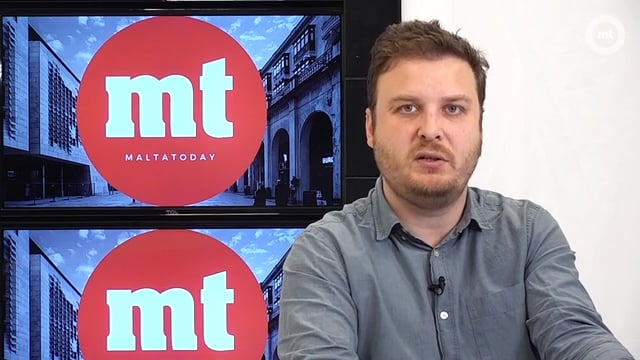[WATCH] Mina Tolu: ‘Respecting my gender pronouns means people see me’
LGBTQ+ activist and now Green Party candidate for the forthcoming European elections Mina Tolu explains gender pronouns and why it's important to respect them


As a society we are all taught pronoun usage through formal education, with rules based on a binary male/female and singular/plural framework.
It sounds reasonable enough to expect that anybody we address might be identifiable as a male or female, but the emancipation of gender identities is challenging this expectation.
People whose identity is non-binary – often members of the transgender, genderqueer, or gender non-conforming communities – want to be addressed by pronouns that do not “misgender” them. Like Mina Tolu, the LGBTQ+ activist and now Green Party candidate for the forthcoming European elections. They – for this is the pronoun that Tolu prefers – identify as a non-binary trans person.
“By a trans person I mean somebody who doesn’t identify with the gender that I was assigned at birth. So, usually whenever somebody is born, the doctors go: you are male or female. I no longer identify as female. But neither do I identify as male, and that’s why we use the term non-binary – to identify something that is not male or female.”
And that means that the common pronouns we usually use for male or female – which are he or she, him or her – do not apply in Tolu’s case. At least when speaking in English, where ‘they’ has become commonly used as a pronoun to refer to a person who neither identifies as male or female.
But why is it important for people to respect these pronouns?
“Well, by respecting somebody’s pronouns, you show that you’re actually listening to them. That you believe that they know who they are, and so you don’t force an idea of what you think they should be on them,” Tolu replies.
“By respecting my pronouns, or by trying to – because I know it can be difficult at times – then I know that they see me, that they have listened to me, even though they might not totally get the whole gender thing or gender spectrum thing… because it can be complicated: I mean, it’s something I was dealing with, talking about every day, because I’m an LGBTQ+ activist, I’ve been working in this area.
“Now, I don’t expect everyone to get it, but if they’ve tried, it shows that they’ve listened to me, and that means their saying: OK then, you know who you are.”
It is an act of common courtesy enough. Just ask, ‘What pronouns do you use?’ Tolu tells me. “You know, it’s like with this interview, you reached out to me and said: ‘Mina, I noticed in some comments, people are referring to you with different pronouns; I noticed in your video you used terms like ‘queer’, so what pronouns do you use?”
Indeed, Tolu referenced their identity in a video they broadcast on Facebook during which they called for a safe space to speak about reproductive rights and sexual education, where they spoke about growing up queer and the effect that taboos have on people’s lives.
Unsurprisingly, the exigencies of respecting gender pronouns invite opposition to change what is an accepted grammatical framework that is being challenge by these complex layers of identity.
Not everyone will subscribe to the virtue of having to account for these changing pronouns, or accept to have to learn how to refer to people in whatever way they see themselves and choose to be seen.
For centuries, gendered pronouns have assumed a reality of cisgender males and females, that is people who identify with the gender assigned at birth. But these linguistic tools do not account for transgender and gender-nonconforming individuals, and whose pronouns cannot be assumed simply on how they look.
“I know it’s complicated,” Tolu replies. “And when it comes to ‘they’ being seen as a collective noun, I say, OK let’s have an example. You go into a shop, and you notice that there is a wallet on the floor. You don’t know who that wallet belongs to, but you go to the shop owner and say that someone has left their wallet behind. Already, there is one person you are referring to with ‘their’. ‘Their’ wallet… so it is part of our language to refer to a person whose gender you don’t know, because they are not in the room usually, you have never seen them before… So I don’t think it’s a big leap to starting using it for people who ask for them.”
Tolu understands that not anyone will subscribe to respecting gender pronouns.
“I myself do not enjoy calling people out for not using the pronouns that I ask them to use. You know I’m in politics. I know, it can be tough. I know there will be a lot of comments for example on Facebook about this.”
But critics will also rush to complain about notions of artificial genders, or those who demand that their pronouns be actual constructions such as fae, ey, per, ve, xe, and ze (all accepted pronouns found in LGBT resources).
“I’ve never had anyone in a face to face conversation tell me: No Mina I’m not going to use that, that’s bullshit. That’s never happened. And so clearly I’ve got the circles that I’m exposed to, who are more exposed to this and are more willing to respect a person’s choice…. I’m not bothered if people say: you have to be a she, you have to be a he, and that’s how it is…
“Language is always evolving… just the fact that you knew the term non-binary, and used the term gender queer, is something new. Many people may say those are artificial terms [but] I don’t see any language anyone comes up with as artificial. Language doesn’t need to be approved always, by some higher entity, for it to be in use.”




.png)

.jpeg)






.jpg)








